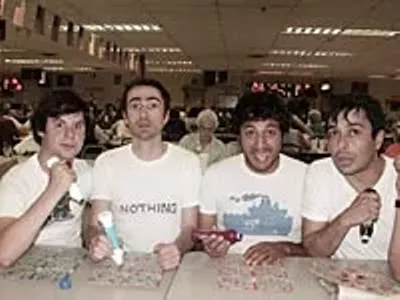Rounding the corner to the back yard, the evening scene is like a midwinter’s daydream. A handful of musicians and boho hipsters cluster in the candlelit yard, sitting cross-legged on the grass or in lawn chairs. They joke in quiet voices, pass around acoustic guitars and light each other’s cigarettes. It’s August and the air is perfumed the idealistic recipe of late summer: two parts cut grass, two parts cooling grill, one part ganja.
Then — without spotlight or introduction — a makeshift show begins. A guitar has made its way around the circle of chairs and into Audra Kubat’s hands. She hunches over it, quietly fingerpicking the changes to a new song. When she begins to sing, intoning the first lyrics to “Georgia,” it’s like the old adage about E.F. Hutton — everyone listens. As well they should — this is Audra’s back yard. These are Audra’s songs. It’s her party and she’ll sing if she pleases.
The melody ambles between Kubat’s plaintive alto and the upper reaches of her falsetto. The song’s story, about an innocent subject named Georgia, mixes messages of addiction and questions of identity. During the performance Kubat slowly rocks back and forth and closes her eyes. It’s a song that Kubat is quick to admit is written about herself, and looking around the back yard at the partygoers’ reactions, it appears it might be about everyone here.
“I think that song [“Georgia”] in particular is a lot about me and people in my life,” Kubat admits. She bashfully giggles off a question about her own addictions, then adds, “I just want to be a child. I want to unlearn some of the things that I’ve learned that have caused me problems, or scarred me. The girl in that song has addictions; we all do. The girl in the song is scared; we all are. She’s confident too. I think it is about myself, and I think it is about many people I know.”
Many of those people in attendance at Kubat’s backyard party are well familiar with the character in the song and Kubat’s impromptu shows. Somehow, without typifying the annoying guitar-playing-guy-at-party cliché, Kubat can pull off performances like this. And it’s a compelling Kubat dichotomy: She plays a stage-frightened, bashful performer one moment and a commanding, sultry kitten the next; she can demand the room’s attention or become the ultimate wallflower. Embracing strong dualities is the keystone of Kubat’s songwriting, which has made her a prominent face in Detroit’s small songwriter scene.
But for all her stage tenure and growing audience, picking up a guitar and playing intimate gigs for friends is the real home to Kubat’s music.
“It seems like Detroit has been in such a cultural lull,” she says. “It’s been neglected and without attention for so long that people were creating just for the sake of creating. There wasn’t any other motive. Now, after that’s been happening for years, there’s a lot of great music and amazing art that has started to surface. People are doing amazing projects in their own spaces everywhere, but it might not be happening where everyone can see it. Those kinds of situations, playing at parties and for friends, are where I come from.”
She tells the story of her debut public performance; at a now-defunct artist commune/hangout called the Foyer House on Detroit’s West Side. Kubat was in the basement singing to a friend while a party was raging upstairs. “Everyone was getting high and running around acting crazy,” she recalls. “My friend Rico Africa — he was kind of the host — he came down and heard me and was like, ‘Girlfriend, what are you doing in the basement? People have to hear you.’”
She came up from the basement and sang for her friends. And so it began. Soon after that fateful night people started hearing Kubat en masse. Her first sizable bit of exposure came while fronting a folk-rock outfit named for her taller-than-average stature, Stunning Amazon. Founded with her then-boyfriend/now-husband, Matt Thibodeau, Stunning Amazon made a name for itself in local arenas by mixing up Kubat’s bent for acoustic folk with unexpectedly zesty metal covers that featured Thibodeau’s guitar wizardry. (Its brilliant take on Ozzy’s “Crazy Train” was actually performed faster than the original.) It seemed like a match made in heaven — Thibodeau the masterminding Sonny to Kubat’s magnetizing Cher. But Kubat says mixing her music and personal life so closely almost ruined both.
“We just didn’t play well together,” she explains, adding her and Thibodeau’s musical collaboration works a lot more smoothly away from the public eye. “I still get really nervous before I play, but back then it was really, really bad. We would fight all the time and I took a lot of my nervousness out on him. When the band dissolved we just got along better. I think being married has helped me focus on music too.”
Kubat’s recent solo work, Million Year Old Sand, captures that focus perfectly. Recorded by Gold Cash Gold frontman Eric Hoegemeyer, the record’s 13 tracks somehow encapsulate the familial tone of Kubat’s relaxed backyard sessions. The collection’s standout may be the urgent confessional plea of “Georgia” (which features some breathtaking guitar work by Thibodeau), but throughout Million Year Old Sand, Kubat’s intuitive observations and nearly autobiographical characters populate every song.
On “Light of Hope” and “Life Has Just Begun,” her adoration of Joni Mitchell is clearly heard, but others, like “Golden Sea” and “In the Morning,” exhume the bones of folk heroes Nick Drake, Tim Buckley and even John Prine. And, unlike 2000’s Elixir, or 2002’s Untitled for Now, she doesn’t just dress in the costumes of her favorite songwriters. … Sand is a document that finds Kubat comfortable in her own skin, every cut all her own. Sure, there are moments when it brushes girl-with-guitar preciousness or where themes of freedom and “soul saving” initially seem overwrought. But as … Sand plays on, Kubat’s exposed weaknesses — an occasional awkward lyric or a slightly wobbly vocal line — become her redemption, instances that make her statements all the more believable.
“Last year I was starting to write the songs for this record immediately after Untitled for Now came out,” Kubat explains. “I wanted to record them right away and I was going to be in the studio much earlier. But, because of one reason or another, I had to hold on to them. I think it helped me. Also, I think I’ve become a better singer; I can describe how I feel when I’m singing better than I used to. When I listen to the new record it strikes me that I’m just more myself than I’ve ever been.”
After a few listens to Million Year Old Sand, the image it creates of Kubat as “herself” is almost unnervingly personal, an irony-free zone. It’s no wonder that performing them live is physically draining. It’s also no wonder that these performances make her one of the city’s most watchable, if not desirable, songwriters.
“I can’t help myself from letting go on stage,” Kubat says. “I want to make the songs affect people the way that they affect me. Playing music is something so deep and from my heart that it is hard for me to do sometimes. It’s draining to love something so much.”
Audra Kubat’s Million Year Old Sand comes out Tuesday on Times Beach records. The record release party is Saturday, Nov. 22, at the Players Club (3321 E. Jefferson Ave.). Terror at the Opera supports. Call 313-259-3385 for info.
Nate Cavalieri is an itinerant critic for Metro Times. E-mail [email protected]





